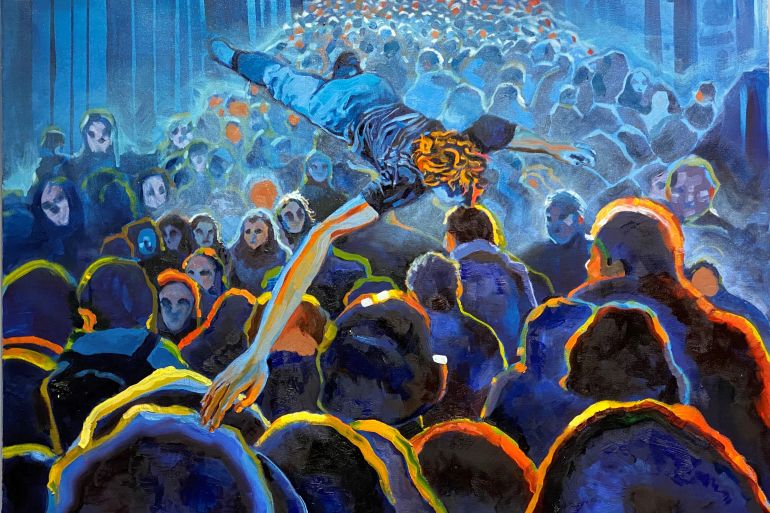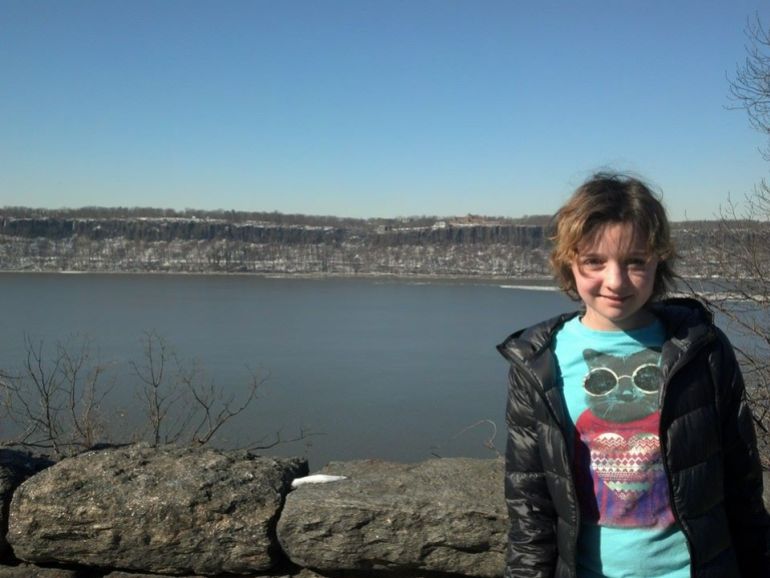The profound permanence of parental grief
Reflecting on five years of missing my daughter.

On day five of COVID, I woke up to the sinking realisation that I couldn’t smell anything. It was as if someone had flipped a switch. All the smells had simply vanished from the world.
Slightly desperate, I put candles and spices and bars of soap right up against my nose – all to no avail. I spent a surreal 10 minutes cleaning the catbox in a complete olfactory void.
Keep reading
list of 4 itemsAfter losing a child: We are a family, but we grieve alone
The myth of the good mother
A letter to … my brother, who died before I was born
An odourless world was profoundly disorienting, but the feeling of surreal otherness was not unfamiliar.
It reminded me of how I’d felt the year my daughter died. I’d walked around in a cloud of deep grief, completely disconnected from everyone and everything.
In those first few awful months, I’d only wanted one thing – to remain close to Ana even in death. I let the living world fade into the background as I held onto every tangible piece of my child. I could see the trees, the blue sky, the mail truck coming and going, but I couldn’t feel any of it. I was numb.
Back then, I couldn’t imagine the numbness ever leaving. Truthfully, I didn’t really want it to. It was a shield keeping me from feeling the full horror of my loss. But gradually life began to return, bit by painful bit.
As months and then years passed, I allowed some of life’s vibrance to return in small ways – in warm spring days and steaming cups of coffee. In the comforting weight of my camera pointed at a migrating warbler. In the slow kindling of new friendships. In the miracle of my younger daughter’s artwork and her laughter and her relentless desire to understand the world.
After five years, I know a lot more about grief than I did in those first, stumbling months, but I also know how little I know. Grief’s intensity and its ever-present demands still surprise me.
I don’t know what I’d expected my grief would become five years ago when I was at the very beginning, still so close to Ana that she glowed in stark relief in my mind’s eye. Five stages, I guess. A neat row of steps laid out in front of me – denial, anger, bargaining, depression and (absurdly) acceptance.
What a load of crap.
I’d hoped I’d find purpose by now. I’d hoped I’d realise some measure of peace. I’d hoped I’d be able to dwell only on the good memories of Ana and how she’d brought joy to our family.
I’d hoped that I’d have a solid relationship with her spirit, a “continuing bond” that made her feel close.
But I didn’t fully grasp the permanence of her absence or how the endless chasm of time would be so relentless. I wasn’t prepared for how much I would change. Would she even know me now?
Imagine a year without seeing your child. Now stretch that year into forever.
I couldn’t have known what five years meant back then. I couldn’t have known that my love would try to follow her forever, always seeking and never finding. My love for Ana is lost with her, somewhere out there in the dark. After five years, I’m still trying to find my way to something like acceptance.
Last week, when I woke up to a world devoid of odour, I panicked. I couldn’t smell Ana’s favourite perfume oil or the champa incense we both loved.
I couldn’t smell the candles I’ve been burning all winter, the ones with hints of amber resin and sandalwood and vanilla. Smells she’d loved. Smells that reminded me of her physical body.
Sitting in my office, staring helplessly at a steaming cup of odourless coffee, I was utterly bereft. Would I ever smell anything again? Would I eventually forget the smell of coffee and of Ana’s precious perfume oil?
In that moment, the weight of years felt like it was crushing me. It had seemed unfathomable how long it had been since I’d heard her voice, touched her face, or smelled her hair. Even the most vivid memories were disintegrating into the abyss of my unreliable mind.
I remember that she’d fallen on that last day and that I’d practically carried her back to bed. The heaviness of her body had surprised me as had her complete lack of strength. She’d been so thin – barely there at all.
I don’t like this memory of Ana, but it’s one of the last times I touched her when she was alive and so in that blank scentless moment, I let myself dwell on how the weight of her felt in my arms.
It’s no wonder that I felt such wild-eyed hysteria at the sudden absence of smell when I brought that bottle of oil to my nose. It had been a sharp, merciless reminder that I can no longer recall with visceral clarity, the memory of my own child.

“Killian would be 29 this year!” My friend Babs texted our group chat a couple of days into my journey with anosmia, the clinical word for a complete loss of smell.
Killian was Babs’s son. He’d died from cancer when he was 16. Now, nearly 13 years later, Babs is one of my best friends. I hadn’t known her when Killian was sick. I’d met her seven years after he died around the time when Ana’s cancer had pivoted from stable to terminal.
Babs had helped me navigate the last few months of Ana’s life. By some miracle, we’ve remained friends ever since. She is far ahead of me on this lifelong journey of parental grief.
I want to ask Babs what it’s like after 10 years have passed, but I’m afraid of what she might say. It’s enough to see that she’s survived more than a decade without Killian. It’s enough to hear her laugh. It’s enough to witness her endless pride and love for her daughter Cally, who was just nine years old when her big brother died.
It’s enough, for now, to hope for an eventual peace – if not acceptance – amid my bottomless grief.
On the first anniversary of Ana’s death, I wanted the world to stop and remember her with me. I learned how to fold paper cranes that year. It was something that Ana had been able to do that I could not, a source of pride for her.
She would gift me cranes and I would collect them happily.
“Ana, this one is my favourite,” I would say about each carefully folded crane. “Can I have another?”
Folded cranes decorated Ana’s memorial and folded cranes kept me connected to her in those first terrible years without her. Cranes were also a way for me to pull people back into Ana’s world, a way for them to recall the reality of her. But time dulls senses. It dulls memories. Ana has been gone for so long that the cranes she’s folded are dusty, battered, and old. They look like I feel.
If the evidence of Ana’s life is fading for me, what must that mean for everyone else? Will the people who knew her wake up one day and experience a kind of anosmia of the soul? Will they feel nothing when they think of her? Has that already happened?
Time is relentless. It chips away at the memories of dead children. It blurs and obscures and erases their short legacies year after ponderous year.
After five years without Ana, the cranes have largely lost their meaning. But I won’t let them go, not completely. Not yet.
I will fold some new ones on March 22, the anniversary of her death. Feeling the cranes take shape beneath my fingers brightens my connection to Ana. At least, for a few short moments before it again begins to fade.
The smells began returning a few days after they’d vanished. They were weak and inconsistent. The first scent that broke through the odourless void was Ana’s perfume oil – a cloying, floral tincture that I’d always found a bit overpowering.
I’d kept the bottle of oil all these years, occasionally breathing in the familiar smell because it’s one of the few things that accurately conjure Ana’s physical presence. I used to close my eyes, inhale deeply, and pretend she was standing right behind me.
When my sense of smell vanished, I’d brought the oil to my desk and gotten into the habit of smelling it multiple times a day. If anything could break the spell of COVID-induced anosmia, I’d reasoned, it was that concentrated vial of perfume oil.
The rush of joy that filled me when I got my first faint whiff was overwhelming. I’d been afraid my anosmia might be permanent. I inhaled the smell of Ana’s perfume again and again. Then I started to cry.
I want, with all the aching endlessness of my grief, for Ana to still be part of the world. I want to feel her and smell her and see her standing in front of me again.
Five years into my grief, I understand what it means to always carry a deep well of sorrow. I understand the permanence of my grief.
Even when I laugh, a part of my soul continues to weep. This will be my truth forever, but … at least I can smell things again.
For now, I will take the moments of joy wherever I can find them. Today that means holding a half-empty bottle of perfume oil up to my nose and gratefully breathing in its familiar scent.